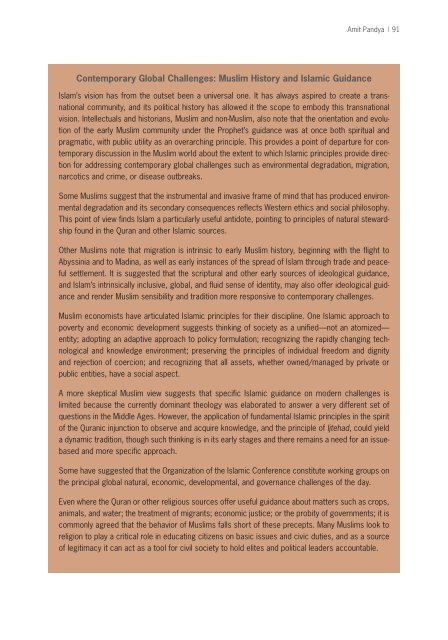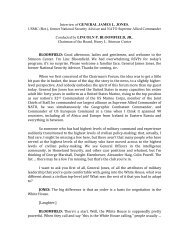Islam and Politics - The Stimson Center
Islam and Politics - The Stimson Center
Islam and Politics - The Stimson Center
You also want an ePaper? Increase the reach of your titles
YUMPU automatically turns print PDFs into web optimized ePapers that Google loves.
Amit P<strong>and</strong>ya | 91<br />
Contemporary Global Challenges: Muslim History <strong>and</strong> <strong>Islam</strong>ic Guidance<br />
<strong>Islam</strong>’s vision has from the outset been a universal one. It has always aspired to create a transnational<br />
community, <strong>and</strong> its political history has allowed it the scope to embody this transnational<br />
vision. Intellectuals <strong>and</strong> historians, Muslim <strong>and</strong> non-Muslim, also note that the orientation <strong>and</strong> evolution<br />
of the early Muslim community under the Prophet’s guidance was at once both spiritual <strong>and</strong><br />
pragmatic, with public utility as an overarching principle. This provides a point of departure for contemporary<br />
discussion in the Muslim world about the extent to which <strong>Islam</strong>ic principles provide direction<br />
for addressing contemporary global challenges such as environmental degradation, migration,<br />
narcotics <strong>and</strong> crime, or disease outbreaks.<br />
Some Muslims suggest that the instrumental <strong>and</strong> invasive frame of mind that has produced environmental<br />
degradation <strong>and</strong> its secondary consequences reflects Western ethics <strong>and</strong> social philosophy.<br />
This point of view finds <strong>Islam</strong> a particularly useful antidote, pointing to principles of natural stewardship<br />
found in the Quran <strong>and</strong> other <strong>Islam</strong>ic sources.<br />
Other Muslims note that migration is intrinsic to early Muslim history, beginning with the flight to<br />
Abyssinia <strong>and</strong> to Madina, as well as early instances of the spread of <strong>Islam</strong> through trade <strong>and</strong> peaceful<br />
settlement. It is suggested that the scriptural <strong>and</strong> other early sources of ideological guidance,<br />
<strong>and</strong> <strong>Islam</strong>’s intrinsically inclusive, global, <strong>and</strong> fluid sense of identity, may also offer ideological guidance<br />
<strong>and</strong> render Muslim sensibility <strong>and</strong> tradition more responsive to contemporary challenges.<br />
Muslim economists have articulated <strong>Islam</strong>ic principles for their discipline. One <strong>Islam</strong>ic approach to<br />
poverty <strong>and</strong> economic development suggests thinking of society as a unified—not an atomized—<br />
entity; adopting an adaptive approach to policy formulation; recognizing the rapidly changing technological<br />
<strong>and</strong> knowledge environment; preserving the principles of individual freedom <strong>and</strong> dignity<br />
<strong>and</strong> rejection of coercion; <strong>and</strong> recognizing that all assets, whether owned/managed by private or<br />
public entities, have a social aspect.<br />
A more skeptical Muslim view suggests that specific <strong>Islam</strong>ic guidance on modern challenges is<br />
limited because the currently dominant theology was elaborated to answer a very different set of<br />
questions in the Middle Ages. However, the application of fundamental <strong>Islam</strong>ic principles in the spirit<br />
of the Quranic injunction to observe <strong>and</strong> acquire knowledge, <strong>and</strong> the principle of Ijtehad, could yield<br />
a dynamic tradition, though such thinking is in its early stages <strong>and</strong> there remains a need for an issuebased<br />
<strong>and</strong> more specific approach.<br />
Some have suggested that the Organization of the <strong>Islam</strong>ic Conference constitute working groups on<br />
the principal global natural, economic, developmental, <strong>and</strong> governance challenges of the day.<br />
Even where the Quran or other religious sources offer useful guidance about matters such as crops,<br />
animals, <strong>and</strong> water; the treatment of migrants; economic justice; or the probity of governments; it is<br />
commonly agreed that the behavior of Muslims falls short of these precepts. Many Muslims look to<br />
religion to play a critical role in educating citizens on basic issues <strong>and</strong> civic duties, <strong>and</strong> as a source<br />
of legitimacy it can act as a tool for civil society to hold elites <strong>and</strong> political leaders accountable.

















